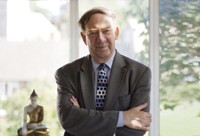Advertisement
Grab your lab coat. Let's get started
Welcome!
Welcome!
Create an account below to get 6 C&EN articles per month, receive newsletters and more - all free.
It seems this is your first time logging in online. Please enter the following information to continue.
As an ACS member you automatically get access to this site. All we need is few more details to create your reading experience.
Not you? Sign in with a different account.
Not you? Sign in with a different account.
ERROR 1
ERROR 1
ERROR 2
ERROR 2
ERROR 2
ERROR 2
ERROR 2
Password and Confirm password must match.
If you have an ACS member number, please enter it here so we can link this account to your membership. (optional)
ERROR 2
ACS values your privacy. By submitting your information, you are gaining access to C&EN and subscribing to our weekly newsletter. We use the information you provide to make your reading experience better, and we will never sell your data to third party members.
The article "Percy Julian, the Movie" mentions a "biographical sketch written by Julian's friend Bernhard Witkop" as one of the few archival resources available to the film's production team (C&EN, Oct. 2, page 52). The article implied that there was little information to work with. I came to a different conclusion after reading the "sketch," which is actually Julian's biographical memoir published by the National Academy Press in 1980. It is authoritative, substantial, beautifully written, and replete with captivating detail. It can be accessed at www.nap.edu/readingroom/books/biomems/pjulian.pdf.
Ray Conrow
Fort Worth, Texas
I first heard about the brilliant African American chemist Percy Julian from a neighbor who worked at Glidden. As an organic chemist interested in syntheses, I heard about Julian's synthesis of important chemicals. Years later, I was hired by Triton College in River Grove, Ill. Jim Litton, who had worked for Julian Industries, had an office near mine. Jim often spoke about Julian.
Julian became a member of the Triton College board of directors. Once a week, he would come early and visit Litton in his office before the board meetings. I once told Julian that Soya breakfast cereal, released during World War II and which he had developed, was the worst that I had ever eaten. He responded jovially, saying that it was one of his failures.
When Julian died in 1975, we heard that he was on the short list being considered for the Nobel Prize in Chemistry.
Today, I own a 580-acre farm in Missouri that grows more than 100 acres of soybeans yearly. As a farmer-chemist, I profit from the discoveries and technology developed by Julian, the greatest African American chemist of the 20th century.
Ed Fashing
Sturgeon, Mo.



Join the conversation
Contact the reporter
Submit a Letter to the Editor for publication
Engage with us on Twitter